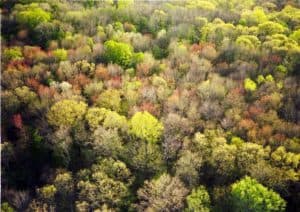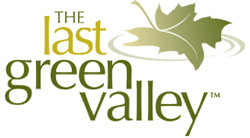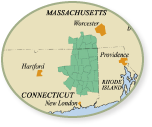
The Last Green Valley Announces First Funding Phase of $12.2 Million Project to Protect the Southern New England Heritage Forest
The Last Green Valley, Inc. and its project partners have launched phase one of a $12.2 million program to help landowners in the Southern New England Heritage Forest conserve their land while improving vital habitat for important bird species.
The program is an unprecedented three-state effort made possible through the Regional Conservation Partnership Program (RCPP) of the USDA Natural Resources Conservation Service (NRCS). Joining NRCS and The Last Green Valley, Inc. (TLGV) as lead partners are the Mass Conn Sustainable Forest Partnership/Opacum Land Trust and the Northern Rhode Island Conservation District.
This program will provide technical and financial assistance to forest landowners with property within the Southern New England Heritage Forest (SNEHF), who wish to conserve their land by granting an easement to NRCS through the Healthy Forests Reserve Program (HFRP). The HFRP is a voluntary conservation easement program for private woodland owners that is new to the region. The deadline for first-round applications is July 20, 2018.
Preserving the Southern New England Heritage Forest is critical for important bird species and other wildlife. With 1.49 million-acres of unfragmented forest corridor stretching along the Connecticut and Rhode Island border to the Quabbin Reservoir in Massachusetts, the Southern New England Heritage Forest is still an astonishing 76 percent forest cover and one of the last viable wildlife corridors from northern New England to the coast in southern New England.
The Last Green Valley National Heritage Corridor accounts for almost half of the Southern New England Heritage Forest. As the last green oasis in the coastal sprawl between Boston and Washington D.C., the program is vital to ensuring the national heritage corridor and the larger Southern New England Heritage Forest continue supporting threatened bird species and other important wildlife and plant species.
NRCS will pay the landowner 75 percent of the fair market value of the enrolled land to promote the recovery of endangered and threatened bird species and improve plant and animal biodiversity. NRCS will also pay for all transaction costs, including a title search, boundary survey, hazardous materials search and appraisal. NRCS will draft a restoration plan for the property that focuses on improving habitat for a specific bird species and will provide 75 percent or more of the funds for the first round of any restoration work that is required.
The funds provided in phase one are a portion of the larger $12.2 million program. NRCS is providing a $6.1 million grant which is being matched by $6.1 of significant contributions from the project’s numerous partners, including the three lead partner organizations and 16 additional organizations.
While the application deadline for the first round of this competitive program is July 20, 2018, we advise potential applicants to contact the lead partner in their state as soon as possible. There are preliminary steps that must be completed, and the partners are available to provide technical assistance:
For Connecticut Projects – Bill Reid, 860 774-3300; bill@tlgv.org
For Massachusetts Projects – Ed Hood, 508-347-9144 (leave a voice mail with your contact info); ehood@opacumlt.org
For Rhode Island Projects – Kate Sayles, 401-934-0840; ksayles.nricd@gmail.com
Application materials are available here.
Supporting partners for this project include: MA Executive Office of Energy and Environmental Affairs, Providence Water, Yale School of Forestry & Environmental Studies, CT Department of Energy and Environmental Protection, Hull Forest Products, Thames River Basin Partnership, New England Forestry Foundation, Eastern CT Conservation District, Norcross Wildlife Foundation, RI Division of Forest Management, RI Woodland Partnership, Harvard Forest, Yale Sustaining Family Forests Institute, Audubon Connecticut, Mass Audubon and Audubon RI.
Get Connected
Sign up for our newsletter
"*" indicates required fields



